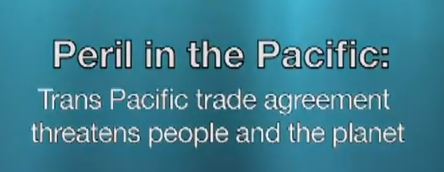In The Australian Financial Review April 2, 2013, Opposition foreign affairs and trade spokeswoman Julie Bishop said a Coalition government would be prepared to consider including such provisions in a range of bilateral and multi-lateral trade talks. In relation to the Korea-Australia free trade agreement, Julie Bishop said:
"I'm informed by South Korean representatives that the failure to include in the negotiations an investor state dispute settlement provision is the reason an agreement cannot be concluded. This is gross negligence or incompetence on the part of [the then Trade Minister] Craig Emerson," she told The Australian Financial Review.
The Coalition's position on the inclusion of ISDS provisions in the Trans Pacific Partnership agreement was reiterated in the Age Newspaper recently (14 July), in response to the new Minister for Trade in the Rudd Government confirming that he will not 'cave in' to pressure on the issue of the inclusion of ISDS provisions.
See article here: http://www.theage.com.au/business/marles-vows-not-to-cave-to-us-pressure-20130714-2py8r.html
The ISDS chapter of the Trans Pacific Partnership agreement applies to all forms and areas of investment, unless specifically exempted by each government. These restrictions could limit the capacity of government to regulate effectively in areas like foreign investment in farmland, the expansion of the coal seam gas industry, as well as environment, health and workplace rights.
The grounds on which investors may sue are very broad and based on US legal concepts, which have been elaborated and reinforced through investor-state disputes flowing out of previous free trade agreements such as the North American Free Trade Agreement and the Andean Free Trade Agreement. (See, for example, Chevron oil's appalling law suit against Ecuador over pollution in Amazon here: http://www.guardian.co.uk/environment/southern-crossroads/2013/jul/15/chevron-environmental-activists-email-accounts)
Under the Trans Pacific Partnership Agreement vast swaths of public-interest policy achieved through decades of struggle are poised to be undermined by transnational corporations wanting to pursue their business models unimpeded by national laws.
Lobbyists working for 600 corporations have direct access to the negotiations, but voters don't. The negotiations have been ongoing for a number of years but the agreement may be signed off soon – possibly by the end of this year, and possibly by a Coalition government that has said it wants to 'fast track' the process.
In the US, the powerful corporate lobby position on the Australian Labor Government's position is, quote: 'American companies should be able to side-step the Australian legal system in the event of certain legal disputes.... The US Chamber of Commerce wants US-domiciled companies to have the option of dealing with legal issues in courts outside Australia under the rules being hammered out for a new Pacific-wide trade agreement.'
While outrageous, the inclusion of ISDS provisions in the TPP agreement aligns comfortably with current conservative right ideologies built around 'small government' and the rule of the market – the same ideologies that gave us the GFC. It is worthwhile noting, however, that while a government led by the current Opposition Leader sees no problem with the ISDS provisions, Worth noting is that John Howard refused to accept the inclusion of them in the Australia-US Free Trade Agreement he signed in 2004, arguing that Australia had its own sophisticated legal system quite capable of handling any disputes arising between transnational corporations and Australia.
Professor Jane Kelsey, Law Faculty University of Auckland warns us "The TPPA will lock future governments into a failed regime where markets rule for the next 100 years."
Dr Patricia Ranald, Convenor, Australian Fair Trade and Investment Network (AFTINET) and Research Associate, University of Sydney adds: 'Investor state dispute rights are a threat to national democracy and sovereignty, and should continue to be excluded from all trade and investment agreements.'
Ideologically bound to support the market, Julie Bishop (current Opposition foreign Affairs spokesperson) has said the Coalition, if elected, will 'prioritise' the signing of the agreement, including ISDS provisions.
For further information see Friends of the Earth US video on the Australian Fair Trade and Investment Network (Aftinet) site: http://aftinet.org.au/cms/node/566#
Click on image to view video.
